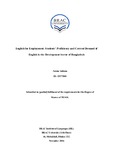| dc.contributor.advisor | Rahman, Dr. Sayeedur | |
| dc.contributor.author | Sultana, Naima | |
| dc.date.accessioned | 2017-07-18T07:28:00Z | |
| dc.date.available | 2017-07-18T07:28:00Z | |
| dc.date.copyright | 2016 | |
| dc.date.issued | 2016-11 | |
| dc.identifier.other | ID 15177008 | |
| dc.identifier.uri | http://hdl.handle.net/10361/8310 | |
| dc.description | This thesis report is submitted in partial fulfilment of the requirements for the degree of Masters of Arts in Teaching to Speakers of Other Languages, 2016. | en_US |
| dc.description | Cataloged from PDF version of Internship report. | |
| dc.description | Includes bibliographical references (page 65-68). | |
| dc.description.abstract | Bangla is the mother tongue of people of Bangladesh. It has also given the status of official language by the constitution of Government of the People‘s Republic of Bangladesh. In operation, however, English is being used in almost all sectors in various official purposes; one exception is government institutions where all local correspondence is done in Bangla. From primary to tertiary levels, students learn English side by side Bangla. Since 1990s National Curriculum and Textbook Board (NCTB) has been trying to successfully implement Communicative Language Teaching (CLT) approach in primary and secondary levels. After around 12 years of learning English, students enter to degree colleges or universities for bachelor‘s degree. Both public and private institutions allow students to get admitted into under graduate programme with a presumed proficiency of English. Students learn English along with their major subjects as part of preparing themselves for getting into a professional life. They, however, are not always aware about the skills they would actually need for their future jobs. This study examines students‘ command and mastery of English at the tertiary level if the command matches the need at workplace, particularly in the development sector in Bangladesh. While focusing on the fact whether students, as new entrants, are capable of communicating and delivering their would-be assigned tasks in English in development organizations, the research includes investigation to find out their current skills, prevailing methods and techniques in learning process, activities in classrooms, personal choices of teachers and students and skills that are given priority as large picture. | en_US |
| dc.description.statementofresponsibility | Naima Sultana | |
| dc.format.extent | 77 pages | |
| dc.language.iso | en | en_US |
| dc.publisher | BRAC University | en_US |
| dc.subject | English proficiency | en_US |
| dc.subject | Employment | en_US |
| dc.subject | Classroom activities | en_US |
| dc.title | English for employment: students’ proficiency and current demand of English in the eevelopment sector of Bangladesh | en_US |
| dc.type | Thesis | en_US |
| dc.contributor.department | BRAC Institutes of Languages | |
| dc.description.degree | M. in TESOL | |

